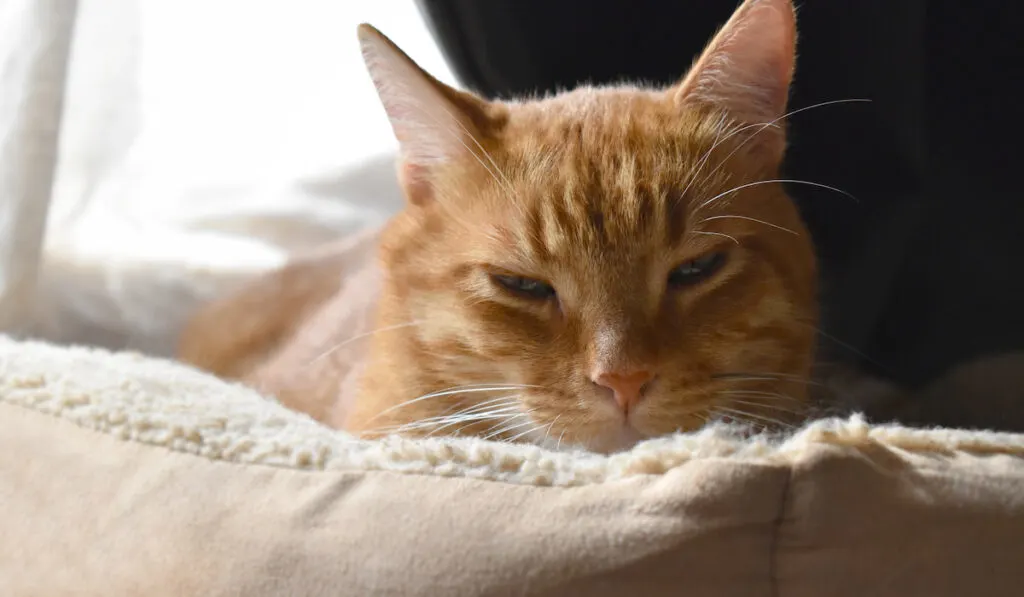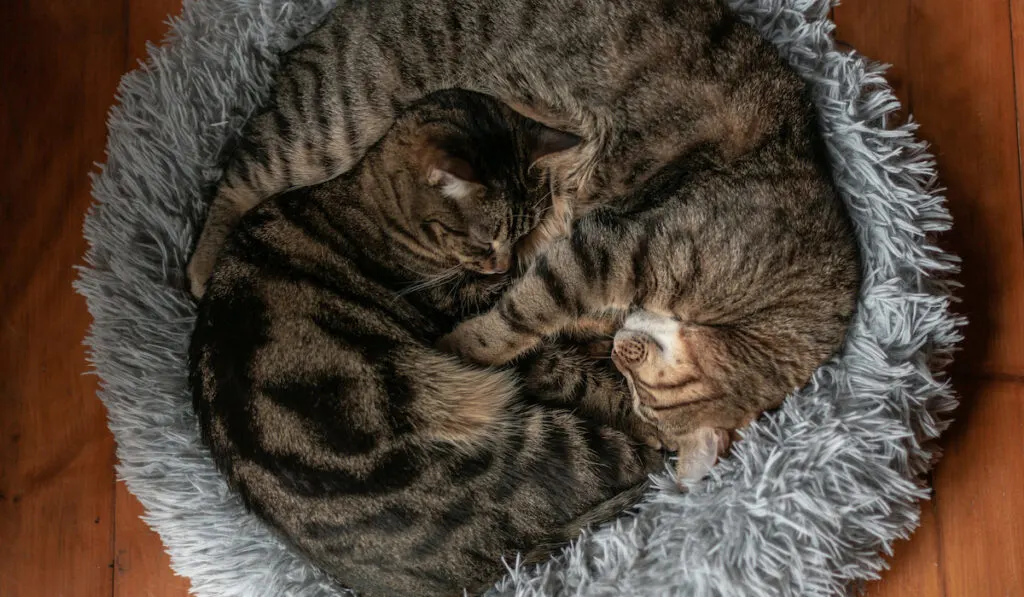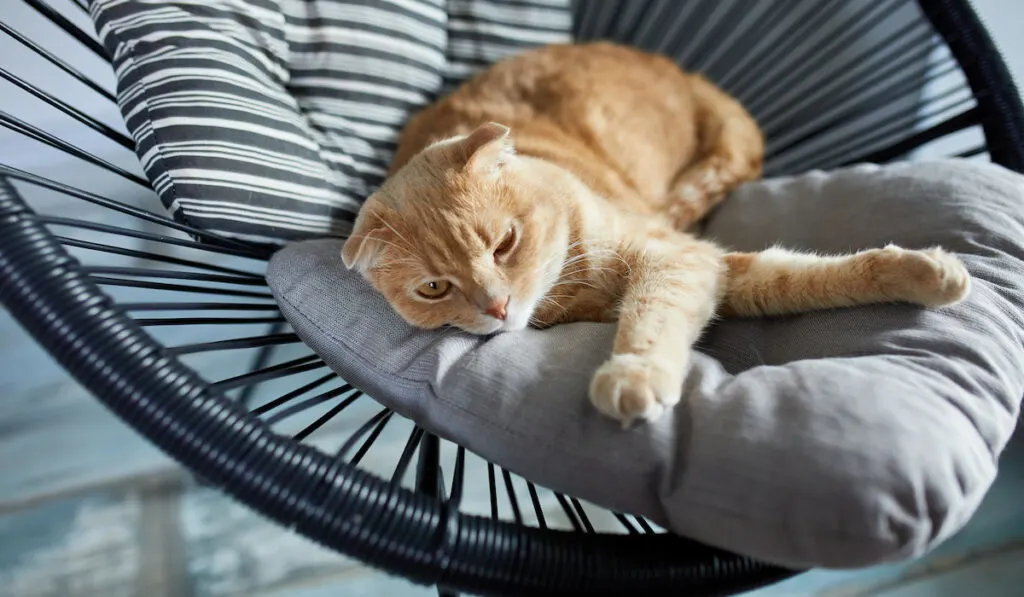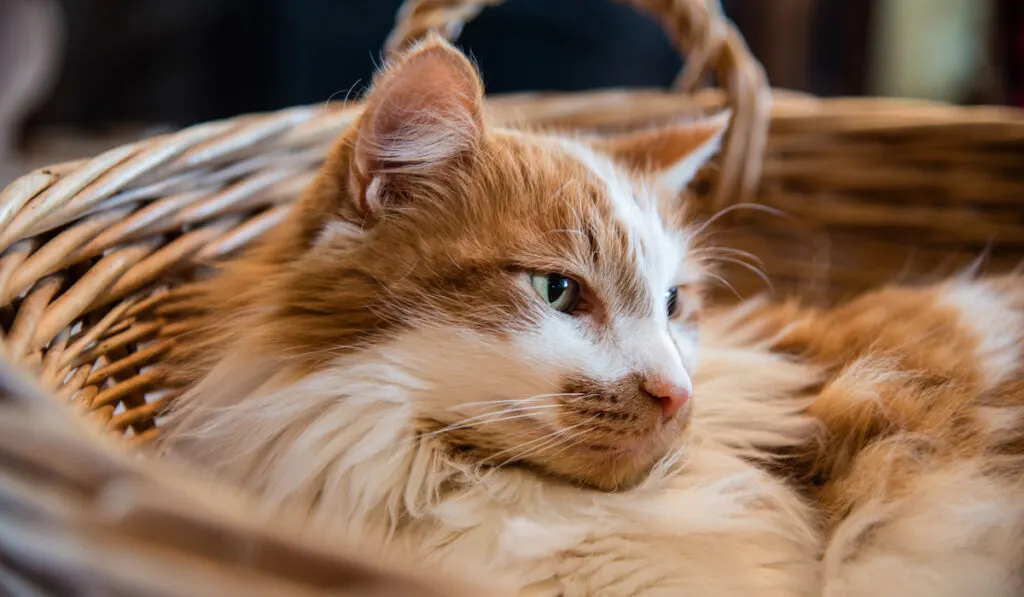Cats are a famously popular pet across the world. The American Pet Products Association (APPA) has determined that nearly 94 million cats were living in households between 2018 and 2019. (source) While cats are widely popular pets, they are also notoriously mysterious with some of their actions. One of those quirky characteristics is the way they steal your seat as soon as you move.

Why does my cat lay in my spot? When a cat lays down in your spot, they are letting you know they are secure. They are also putting their scent on the spot, which indicates they are part of your family.
Many times, cat owners get up to go to another room, only to find their furry feline has taken over their space. You will likely notice him or her rolling around and nestling into the area. In this article, you will find out exactly why cats exhibit this behavior.
Table of Contents
My Cat Takes my Spot
Cats have a remarkable sense of smell. A cat’s sense of smell is very complex and allows them to smell pheromones (chemicals released by the body). Sydney Stephens, a writer for Mother Nature Network (MNN), explains how this sense of smell determines many of a cat’s actions, in the article, A Cat’s Nose Knows More than You Think.

When cats rush to overtake the area you just got up from, there is a likely a good reason for the behavior. Chances are that the response is stemming from the cat’s sense of smell and the need they have for making sure their scent is also included.
When cats take over a spot, they typically roll around or burrow into the space and are not easily moved. They are doing this because they are showing that they are part of the family by including their scent with yours and marking their territory.
Marking Territory
Hearing the phrase marking your territory probably brings the image of a dog urinating on various places to “mark their territory.” Cats can do the same thing, but they often mark their territory by rubbing against you or the spot they stole.
The action of rubbing against either a person or object places pheromones on that object, and it is suddenly designated as theirs.

If you have ever come home from another pet owners’ home, you have likely noticed your cat either avoiding you or rubbing all over you when you sit down. They can smell the pheromones from the other animal and are trying to replace them with their own.
They are a Part of Your Family
Not only do cats love to steal your seat away, but you may also notice them rolling incessantly in the spot. Many think this a way the cat is scratching their back, but there is a more scientific explanation for the behavior that is occurring.
Your cat is trying to get their scent on the seat for a very particular reason. While placing their scent on the area where you were sitting, they are mixing their scent with yours. They are doing this to show they are a member of the same pack or family. This is called a group scent.
Group Scent
In the article, How Cats Create a Group Scent, Pam Johnson-Bennet explains the importance of cats having a group scent. In 2018, the American Veterinary Medical Association (AVMA) determined that individuals with cats typically had an average of 1.8 cats. When cats live in a group, even as small as a pair, a group scent is important for their well-being.
Because you are a large part of their group with your caretaking and the security you provide, you are a member of that elite group as well.
You will notice cats rubbing on one another when playing or resting. They do this for the same reason they rub on their humans. They are creating a group scent that is specific to their family.

This group scent ritual is why it is challenging to bring strange cats together. The scent helps warn them of possible danger, unfamiliar cats, and even people. If you have noticed your cat running from strangers, this could be a reason why.
A Sense of Security
Cats are quite vulnerable creatures. Sure, they are natural-born hunters and can fare quite well in a wild environment if forced to do so; however, domesticated housecats need a firmer sense of security.
To your cat, YOU are that security blanket. They know you can be trusted to protect them and make sure their needs are met.
According to Sarah Jackson in the article Cats Really Do Need Their Humans, Even if They Don’t Show It, cats are very dependent on their humans for a sense of security. She explains that cats form a bond that is like that of dogs and babies.
You can tell your cat is secure if they exhibit the following behaviors:
- They give you a greeting.
- They roll on their back.
- They rub their head up against you.
If your cat is displaying these behaviors, it is likely they feel very secure with you and trust that you are going to take care of them without question.
Feline Behavior
Many people often say an animal exhibits certain behavior because they are trying to become the alpha of the family. For some animals, this may be true, but for a cat, it isn’t likely the reason at all.

Cats can be very social, and once they have learned to trust you, they are going to be a faithful companion. Along with this faithfulness comes some behavior you may question, such as seat stealing and the kneading of specific areas.
While it is easy to see why this can be mistaken as an alpha behavior, it is merely a method for them to mark their territory and show they are a part of the family that belongs there. However, some cats are more territorial than others.
Alpha Behavior
True alpha behavior is typically exhibited between cats and other cats, not cats and humans. For example, if a cat in the household is challenging another cat for a seat in your spot once you leave, this could be interpreted as alpha behavior.

Dr. Nicholas Dodman explains the occurrence of cat behaviors as they may relate to an alpha dominance issue in his article The Alpha Cat Syndrome, which was published on the Tender Care Animal Hospital website.
He shares that real alpha behavior is going to involve much more than rolling in seat spaces. Some of the issues that occur with true alpha behavior are biting and clawing.
How to Handle Alpha Behavior
If you have a cat that is exhibiting true alpha behavior, it is something that needs to be dealt with appropriately before it becomes problematic. In her article How to Deal With Alpha Male Cats, Gabrielle Nicolet suggests the following strategies to help curtail the behavior.
- Track the cat’s behavior to see when it is occurring most frequently and what could be triggering the behavior.
- Set a specific feeding time.
- Limit the attention you provide. Ideally this should only be when the cat is behaving appropriately.
- Reward good behavior with toys. Don’t make them accessible all the time.
- Ignore any alpha behaviors. This helps the cat to understand poor behavior won’t get attention.
If you attempt all these things and the behavior is worsening or staying the same, it may be time to speak with your vet to make sure there are no underlying health conditions.
Final Thoughts
Cats are complex creatures and have behaviors to match. If you have a cat that is constantly stealing your spot, you now have a better understanding of why it is happening. The cat isn’t trying to take over your territory; it is their way of saying they are a part of the family, and they feel safe and secure with you. They aren’t trying to dominate you or your house.
However, if the behavior is coupled with biting or aggression, you may want to speak with your vet because there could be underlying causes for the behavior.
